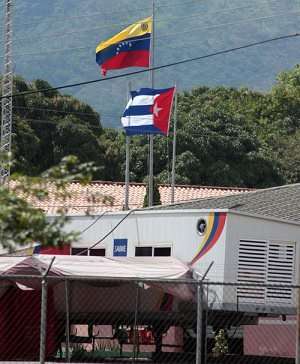Hugo Chavez's Venezuela: Cuba's Paymaster and Vassal
The Castros knew more about Chavez's medical condition than in his inner circle in Venezuela

Over at the New Republic, Venezuelan journalist Francisco Toro writes about the relationship forged between Hugo Chavez when he was president of Venezuela and Cuba's Fidel Castro, who outlived the strongman 28 years his junior. An excerpt:
As the unquestionably senior member of their Cold War alliance, the Soviets treated Cuba as just another satellite state; Fidel's subjugation to a cold war superpower was always something of an embarrassment to him.
In the Caracas-Havana axis, by contrast, the paymaster doubled up as the vassal. Venezuela effectively wrote a fat petrocheck month after month for the privilege of being tutelaged by a poorer, weaker foreign power.
The extent of this reverse colonization was startling. Cuban flags eventually came to flutter above Venezuelan military bases and Venezuelans witnessed the surreal spectacle of a democratically elected president telling them that Venezuela and Cuba share "a single government" and that Venezuela "has two presidents." Cuban military advisors kept watch over Venezuela's entire security apparatus, and had exclusive control over Chávez's personal security detail. Through most of his 20-month battle with cancer, the Castros had better information about the president's condition than even his inner circle back home, and they maneuvered successfully to ensure a pro-Havana diehard, Nicolás Maduro, won the tough battle for succession.
Chávez imported more than just personnel and advice; he imported the Cuban Revolution's eschatology virtually whole. Fidel's vision of revolution as a kind of cosmic morality play pitting unalloyed socialist "good" in an unending death struggle against the ravages of "evil" American imperialism became the guiding principle of Venezuela's revolution. The use and abuse of anti-imperialist rhetoric as a mechanism for consolidating authoritarian control over society was the most valuable lesson Chávez learned from Fidel. A superheated brand of unthinking anti-Americanism became the all-purpose excuse for any and every authoritarian excess, stigmatizing any form of protests and casting a dark pall over any expression of discontent or dissent. The technique's infinite versatility proved its central attraction: You could blame shadowy gringo infiltrator for neighborhood protests over chronic power shortages just as easily as you could silence whistleblowers of government corruption by casting them as CIA fifth columns.
In Cuba, considering the island's history as a target for American imperialist meddling, anti-imperialism—however wantonly abused—rested on a bed of historic verisimilitude. But in Venezuela, a country with no history of direct American imperial aggression, this borrowed bit of rhetorical posturing served only to underline chavismo's derivative status, its ideology a kind of fidelista hand-me-down lacking even the self-awareness to realize it was decades out of date by the time it was born.
And if Hugo Chavez's purported ideology is already a derivative of a derivative, what does it say that it appears to be embraced as something to aspire to by some on the left in so-called advanced democracies?
Read the rest of Toro's piece here.


Show Comments (8)